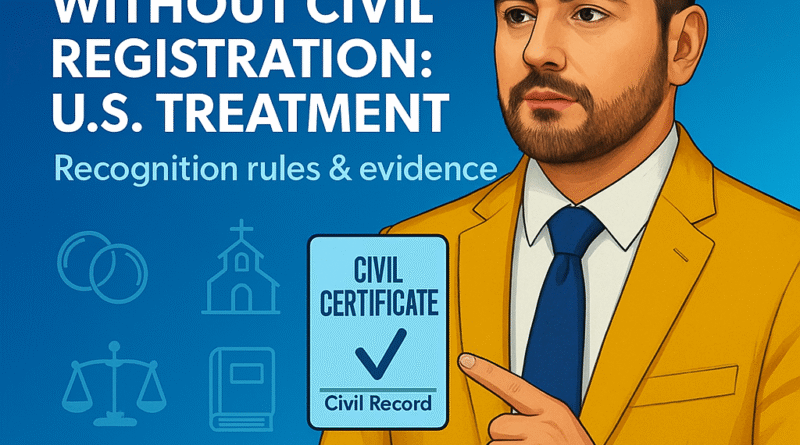Religious-Only Marriages (No Civil Record): U.S. Recognition Rules
Conflict of Laws Family Law Immigration Evidence
Objective: Explain how U.S. courts and agencies treat religious-only marriages without civil registration. You’ll see the core rules, public-policy limits, documentation strategies, decision tables, and a practitioner-style checklist to avoid denial or 221(g)-type delays.
Baseline: the place-of-celebration rule
U.S. courts usually start with the place-of-celebration rule (lex loci celebrationis): a marriage that is valid where it was created is ordinarily recognized in the United States. But many countries distinguish between a religious rite and a civil marriage recorded by the state. If the law of the celebrating jurisdiction requires civil registration to create a civil marriage—and a couple has only a religious certificate—no marriage exists under that law. In such cases, U.S. forums typically find no valid marriage to recognize.
Bottom line: U.S. recognition follows the legal effect given by the celebrating jurisdiction. If a religious ceremony by itself creates a civil marriage there, U.S. forums often recognize it. If civil registration is necessary and missing, recognition usually fails.
Why the civil record matters
Courts and agencies rely on official vital records because they show that statutory prerequisites (capacity, officiant authority, witnesses, registry entry) were met. A clergy letter or religious certificate can prove a ceremony occurred, but it does not prove that the jurisdiction created a civil marital status unless local law says so. Immigration officers, in particular, are trained to look for the civil certificate named in reciprocity/document tables for that country.
Recognition workflow for religious-only unions
How common is recognition?
Conceptual recognition rates (illustrative)
Comparative snapshots (illustrative, not exhaustive)
France / Germany (civil-first systems)
Religious rites do not create civil marriage. Only a marriage before a civil officer (and entry in the register) produces legal status. A religious-only ceremony is generally not recognized.
United Kingdom (authorized religious officiants)
Many religious ceremonies performed by authorized persons and properly registered create a civil marriage. A religious ceremony outside the registration framework may fail.
Brazil / Mexico (religious with civil effects if registered)
Religious ceremonies can acquire civil effect when recorded in the civil registry within statutory timeframes. Without registration, the union may remain non-civil.
Evidence package: what to submit
| Item | What it proves | Practice notes |
|---|---|---|
| Civil marriage certificate (long-form if available) | That a civil marriage exists under local law | Preferred everywhere. Request a version intended for international use, if offered. |
| Religious certificate plus registry extract | That the religious rite was recorded as a civil marriage | Show the statutory basis for converting or registering the rite. |
| Statute/civil code excerpt | Legal effect of religious rites and registration rules | Attach certified translation; highlight the specific article/section. |
| Late registration order or administrative letter | That the state accepted a late entry with civil effect | Pair with proof of identity, residence, and witnesses as the statute requires. |
| Secondary evidence (church book extracts, affidavits) | Fills gaps where records are missing | Include an expert statement that such evidence is legally accepted in that jurisdiction. |
| Authentication (apostille/legalization) & translation | Authenticity and usability in U.S. forums | Follow Hague Apostille or consular steps; use certified English translations. |
| Capacity proofs (divorce/death, age approvals) | That parties could lawfully marry | Certified copies with translations; check effective dates carefully. |
Decision matrix: will a religious-only union be recognized?
| Scenario | Courts (civil status) | Immigration (spouse benefits) | Notes |
|---|---|---|---|
| Religious ceremony that by law creates civil marriage (no separate registration) | Recognized | Recognized | Provide legal citation + certified certificate acceptable in that country |
| Religious ceremony later registered in civil registry (on time) | Recognized | Recognized | File civil certificate or registry extract that shows conversion |
| Religious ceremony only; jurisdiction requires civil registration; no late registration | Not recognized | Not recognized | There is no civil marriage under local law |
| Religious ceremony; late registration permitted and completed | Often recognized | Often recognized | Submit late-registration order + civil certificate |
| Religious ceremony with policy bar (polygamy/close-kin/forced) | Not recognized | Not recognized | Denied even if local law might allow the union |
Recurring fact patterns and how to handle them
“Nikah only” with no civil record
- Many Muslim-majority countries issue a government marriage record even when a religious ceremony occurs. If you only have a mosque certificate, verify whether the state requires an entry in a civil register or a qadi court record to create civil status.
- Solution: secure the government record or complete late registration; attach legal citations that the record creates civil effect.
Jewish kiddushin or Christian rites without registry
- In civil-first systems (e.g., many parts of Europe), a synagogue or church ceremony alone does not create a marriage; one must marry at the registrar or have the officiant registered with the state.
- Solution: obtain the civil certificate; if the law permits, record the religious rite within the time limit to give it civil effect.
Customary/tribal marriages
- Some jurisdictions give civil effect to marriages concluded under customary law if certain rites are observed and the union is recorded in a local register.
- Solution: gather a statutory extract, local registry entry, and an expert statement explaining the custom’s civil effect.
Mixed-system countries
- In countries with religious personal-status systems, religious courts may issue judgments/certificates that are the civil record. Proof focus = authenticity and court authority.
Common pitfalls (and how to avoid them)
- Submitting a clergy letter instead of the civil certificate. Fix: file the civil record named in the country’s document guidance; include registry extracts if needed.
- Assuming “church wedding” = legal marriage. In many places, it doesn’t. Always show the statute or government guidance that gives civil effect.
- Ignoring time limits for registration. Missing a 30-day/90-day deadline can require court-ordered late registration; plan early.
- Capacity gaps. No certified divorce/death record for a prior marriage is a common reason for refusal.
- Authentication failures. Some courts require apostilles/legalizations; plan for this lead time.
- Translation issues. Uncertified or partial translations lead to RFEs/continuances.
Quick Guide
• Start with the law. Does a religious ceremony alone create a civil marriage in that jurisdiction?
• If yes: collect the government-issued marriage record (or the religious record that the statute says is the civil record) + translation + authentication.
• If no: obtain proof of civil registration (on-time or late) before filing; a religious certificate alone will typically fail.
• Show capacity. Certified prior divorce/death records, age approvals, and witness requirements.
• Anticipate policy screens. Exclude polygamy, close-kin, forced or underage unions without judicial authorization.
• Explain unusual formats. Add a short memo or expert statement citing the statute/regulation that grants civil effect.
• Bring originals. Upload clear scans; carry originals to interviews and hearings.
FAQ
Does the U.S. recognize a marriage blessed in a church with no civil registration?
Only if the law of the place where it happened treats that church ceremony as creating a civil marriage. If civil registration is required and missing, the U.S. usually finds no marriage to recognize.
We later registered the religious ceremony. Is that enough?
Often yes, if the jurisdiction permits late registration with civil effect. Submit the civil registry entry or court order plus translations and, if necessary, an apostille/legalization.
For immigration filings, must I always provide the civil certificate?
Practically yes. Adjudicators expect the civil record listed in country document guidance. Where religious records are the civil record, cite the law and file the exact document form they specify.
Do I need an apostille?
Some forums do require apostilles or consular legalizations to authenticate the signature/seal on foreign public documents. Immigration benefits often accept certified copies and verify authenticity directly, but check the receiving forum’s rules.
What if the registrar’s books were destroyed or never kept?
Use secondary evidence (church registers, affidavits from witnesses, local authority letters) and an expert statement that the celebrating jurisdiction legally accepts such substitutes to establish marital status.
Is a religious-only marriage more likely to be treated as a sham?
No, the core issue is legal effect, not motivation. However, because documentation is thinner, agencies may ask for robust evidence of a shared life (residence, finances, family) in addition to fixing the civil-status problem.
Our country recognizes customary marriages. Do we still need a civil certificate?
It depends on the statute. Some systems treat customary marriages as civil when recorded in a local register. Provide the registry entry and a legal citation describing the custom’s civil effect.
Does U.S. constitutional “Full Faith and Credit” help?
Full Faith and Credit binds states to recognize each other’s acts, not foreign countries. Recognition of foreign marriages rests on comity and the place-of-celebration rule, limited by strong public policy.
Can we rely on a clergy affidavit plus photos?
Not if civil registration is required by law. Such materials can support late registration or secondary-evidence frameworks, but they rarely substitute for the civil record itself.
Are there special rules for name changes?
Recognition of marital status does not automatically change names in all systems. Use the civil marriage record to complete agency-specific procedures (passport, Social Security, DMV).
Technical basis & legal framework (concise)
- Place-of-celebration rule: U.S. forums typically recognize marriages valid where celebrated, absent strong public-policy exceptions.
- Civil-effect requirement: In many jurisdictions, only a state-recorded marriage creates civil status; religious rites alone may not.
- Public-policy exceptions: Polygamy, prohibited degrees of kinship, certain underage or coerced marriages are routinely denied recognition.
- Immigration overlay: Federal adjudications hinge on the marriage’s validity where celebrated and require the document type specified by that country’s civil-document guidance; unusual forms (proxy/customary/religious) must be shown to have civil effect.
- Evidence & authentication: Certified civil records with certified translations; apostille or consular legalization when required; secondary evidence accepted only where the celebrating law allows it.
Compliance checklist
- ☑ Determine whether the celebrating jurisdiction grants civil effect to religious rites and under what conditions.
- ☑ Obtain the civil certificate or a registry extract showing the religious ceremony was duly recorded.
- ☑ If necessary, pursue late registration with a court or registrar; attach the order/entry.
- ☑ Add certified translations and apostille/legalization as required by your forum.
- ☑ Prove capacity: certified divorces/deaths, age consents, officiant authority, witnesses.
- ☑ For immigration, match the exact document name listed in country guidance; avoid substitutes.
- ☑ If records are missing, assemble secondary evidence and an expert letter explaining why it is acceptable under the celebrating law.
- ☑ Keep originals for interviews/hearings; submit legible scans in e-filing portals.
Educational material only. The rules and outcomes vary by U.S. state and by the foreign country involved. For case-specific strategy, consult a licensed attorney.

